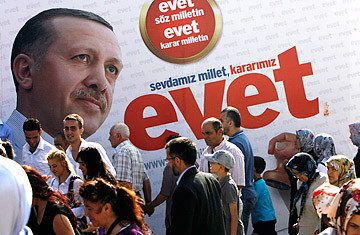
A huge "Evet" (Yes) poster put up by Prime Minister Recep Tayyip Erdogan's ruling Islamic-rooted Justice and Development Party in Istanbul's Uskudar district
For a figure of huge controversy, retired general Kenan Evren, 93, leads a quiet life on the sunny Turkish coast, dabbling in still-life oil painting and the opening of local shops. All the while, he has been the subject of many a barbed joke among Turks, bitter that such that an idyllic retirement is the reward for a man who presided over the traumatic 1980 coup in which thousands of people — primarily leftists — were arbitrarily jailed and tortured. Protected from prosecution by a constitution he helped draft, nobody imagined that Evren might one day be taken to task for his role in that debilitating chapter of recent Turkish history.
But Turkish voters this weekend voted overwhelmingly in favor of several reforms to the constitution that include allowing officers of that era to be tried. And, on Monday, the day after the referendum, several rights groups filed petitions calling for Evren to be prosecuted.
Whether or not the nonagenarian general is actually brought before a court (his age makes it unlikely), it is the symbolism that counts. The constitutional reforms won a 58% approval vote, a victory for Prime Minister Recep Tayyip Erdogan's efforts to extend civilian control over the military, a powerful behind-the-scenes force in Turkey that has staged four coups in as many decades in the name of stability and secularism.
Yet the 42% no vote is significant. Turks remain deeply divided over ostensibly laudable democratic reforms, not because of their content but because of suspicions about the man driving them and his Islamist past. Many Turks are wary of Erdogan's authoritarian streak — he has been nicknamed "Sultan Erdogan" — and question his motives. They have criticized him for cherry-picking European Union–inspired reforms only when it allows him to trim back his two biggest secularist opponents, the military and the courts. Those two institutions see themselves as custodians of Turkey's secularism and have repeatedly clashed with Erdogan. As recently as 2008, the country's top court almost banned his Justice and Development Party for antisecularism, as it had several previous parties with religious affiliations.
It is the Establishment secularist judges who may be the biggest losers in the weekend vote. The most controversial of the approved reforms paves the way for political appointments by parliament and the President to Turkey's highest court, the Constitutional Court and the Supreme Board of Prosecutors and Judges, which controls most senior judicial appointments. Even though this is similar to the systems in most European countries, critics worry that the government will use the changes to name religious conservatives to important positions. Well-heeled Turks at the FIBA World Championship game that pitted Turkey's basketball team against the U.S. on Sunday night booed in protest when Erdogan arrived with his ally President Abdullah Gul. "Nobody can stand in the way of Erdogan now," columnist Mehmet Yilmaz wrote Monday in the mainstream Hurriyet newspaper. "What Turkey will see now is a series of steps that will turn him into Putin."
Erdogan's referendum victory is widely seen as a preview of his chances of winning a third term in nationwide polls next year. It also shows that his main opponent Kemal Kilicdaroglu, a former civil servant with a strong anticorruption record who recently took over the social-democratic Republican People's Party (CHP), has his work cut out for him.
For his part, Erdogan sought to appease critics on Sunday night by saying that he would seek a new, more democratic constitution if re-elected in 2011. A more immediate test of his democratic intentions will be whether he uses the vote of confidence to restart stalled peace efforts to end three decades of fighting against Kurdish guerrillas and address the grievances of Turkey's sizeable Kurdish minority. Millions of Kurds across the southeast boycotted Sunday's referendum.
"The real success of the boycott in the southeast is significant," says commentator Andrew Finkel, author of Turkey: What Everyone Needs to Know. "It is difficult because Erdogan faces resistance from within his own party on the Kurdish issue, but what he can do is to ensure that Kurdishness enjoys the same equality before the law as Turkishness. If he can remove formal discrimination then he's basically drawn a line in the sand and said this is what democratic countries do, and that would be very important for Turkey."
